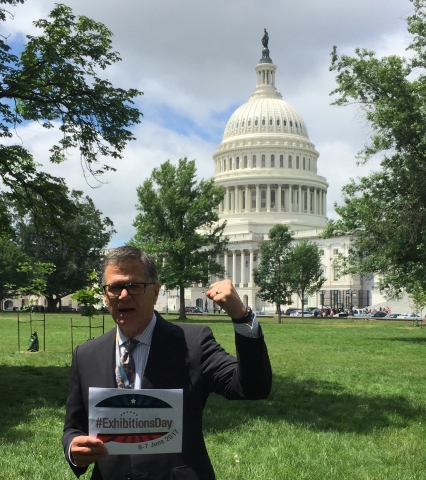Exhibitions Day Attendees Set to Advocate on Behalf of $91 Billion Industry June 5-6 in DC

The Exhibitions Mean Business campaign will hold its fifth annual Exhibitions Day on Capitol Hill June 5-6 to champion the impact that the exhibitions industry has upon the U.S. economy.
According to new information obtained by the Center for Exhibition Industry Research (CEIR), events contributed $91 billion to the U.S. GDP in 2017, approximately a $10 billion increase from what was previously reported.
“Recent data shows the economic contribution of events, which includes direct spending of organizers, exhibitors, attendees and venues, totaled $91 billion in 2017,” said Allen Shaw, Ph.D., Chief Economist for Global Economic Consulting Associates, Inc.
He added, “This notable increase from previous records further emphasizes the importance of face-to-face connections in conducting business.”
Trade shows, conventions and other face-to-face gatherings are major commerce platforms that play a vital role in the health of the American economy. Exhibitions Day, the industry’s annual event on Capitol Hill, brings together professionals from across the country to educate members of Congress about the power of events and address issues that are affecting the health and growth of these trade channels.
Here are topics that will be discussed at Exhibitions Day 2018:
- Online Booking Scams: Upwards of 15 million fraudulent online bookings scams happen each year, resulting in more than $1.3 billion in lost revenue for hotels and money from consumers. Attendees will look to encourage policymakers to vote in favor of laws, particularly H.R. 2495 and S. 1164, that will prohibit websites from pretending to be hotels and allow state attorneys general to pursue restitution and refunds on behalf of the victims.
- Safety and Security: The International Association of Exhibitions and Events (IAEE) and its partners have aligned with the Department of Homeland Security to develop the Exhibitions and Meetings Safety and Security Initiative (EMSSI), which aligns convention center security guidelines with federal programs and the Department of Homeland Security/Safety Act Office. The accreditation program is in its final stages and is anticipated to launch later in 2018.
- Travel Facilitation: The U.S. percentage of global travel fell from 13.6 percent to 11.9 percent this year — the first drop after more than a decade of consistent growth. To stay competitive in the global market and maintain a secure, welcoming environment that is conducive for business deals and events, policymakers must prioritize attracting international tourism.
- Infrastructure Investment: Without sufficient transportation, ample housing and dining infrastructure, it is nearly impossible to attract trade shows and other meetings, which generate millions of dollars in tax revenue for cities.
“Exhibitions Day is an invaluable forum to meet face-to-face with members of Congress and discuss important matters that strain our industry, and as a result, impact local economies,” said CEO and President of the International Association of Exhibitions and Events (IAEE) David DuBois, CMP, CAE, FASAE, CTA.
He added, “It is our responsibility to equip our nation’s leaders with the knowledge needed to shape our country to better facilitate domestic and international business deals.”
Exhibitions Day was established in 2013 to serve as a platform to engage in uninterrupted, one-on-one dialogue with federal legislators and other policy influencers. Over the years, hundreds of people have joined the Exhibitions Mean Business campaign on Capitol Hill to hold these informational and educational conversations.
Sponsors of Exhibitions Day include Reception Sponsor Trade Show Executive Magazine, Registration Sponsor Streampoint Solutions and Transportation Sponsor Convention and Event Transportation Management (CMAC).
Supporting organizations include the American Society of Association Executives (ASAE), Canadian Association of Exposition Management (CAEM), Center for Exhibition Industry Research (CEIR), Corporate Event Marketing Association (CEMA), Destinations International, Events Industry Council (EIC), Experiential Designers + Producers Association (EDPA), Exhibition Services & Contractors Association (ESCA), Exhibitor Magazine, GES, International Association of Venue Managers (IAVM), IAEE MATSO Council, Meetings Mean Business, Meeting Professionals International (MPI), Professional Convention Management Association (PCMA), Society of Independent Show Organizers (SISO), Trade Show News Network (TSNN), Union of International Fairs (UFI), and U.S. Travel Association.
For more information about Exhibitions Day or the exhibitions industry, please visit the Exhibitions Mean Business website. Follow on Twitter @ExhibitsMeanBiz for commentary and news surrounding Exhibitions Day.


Add new comment